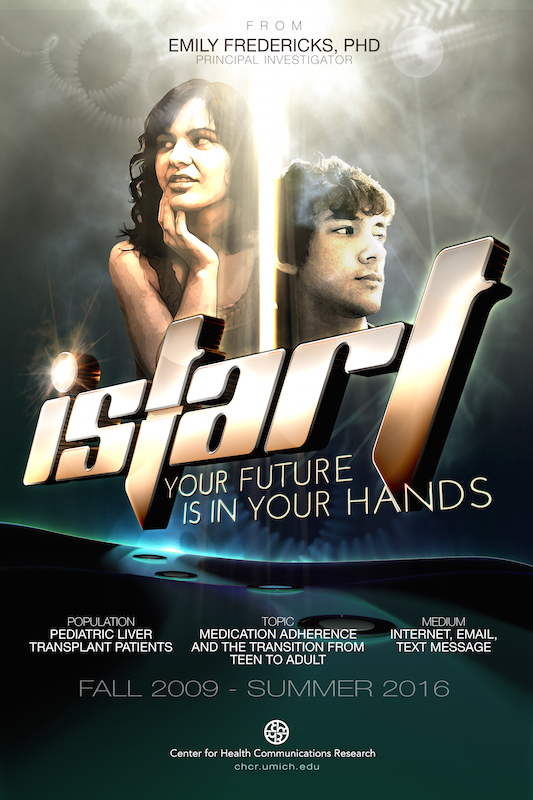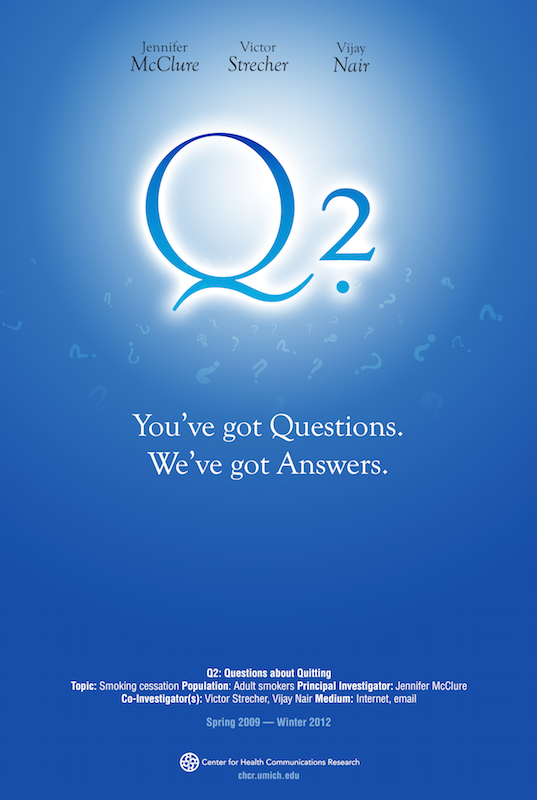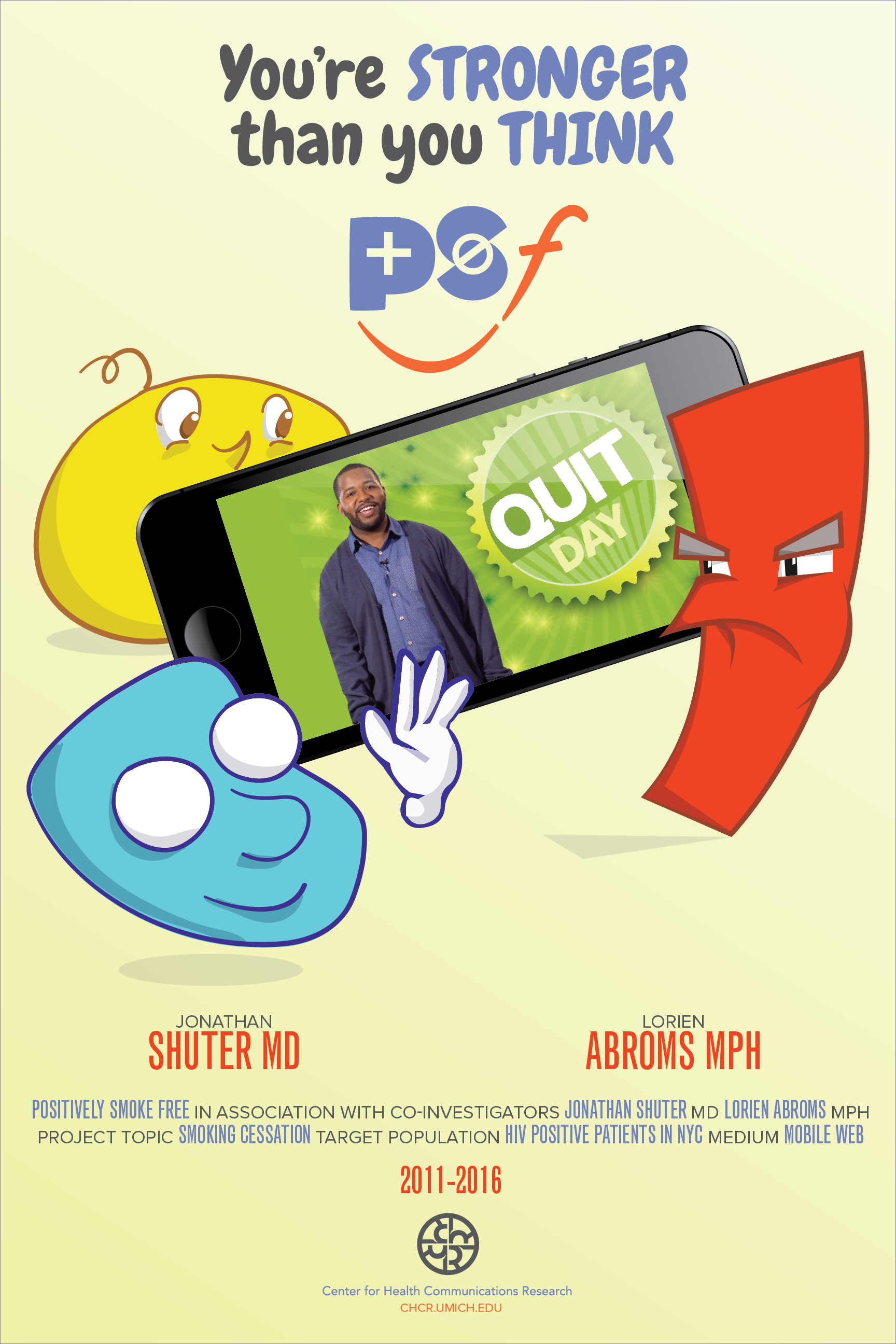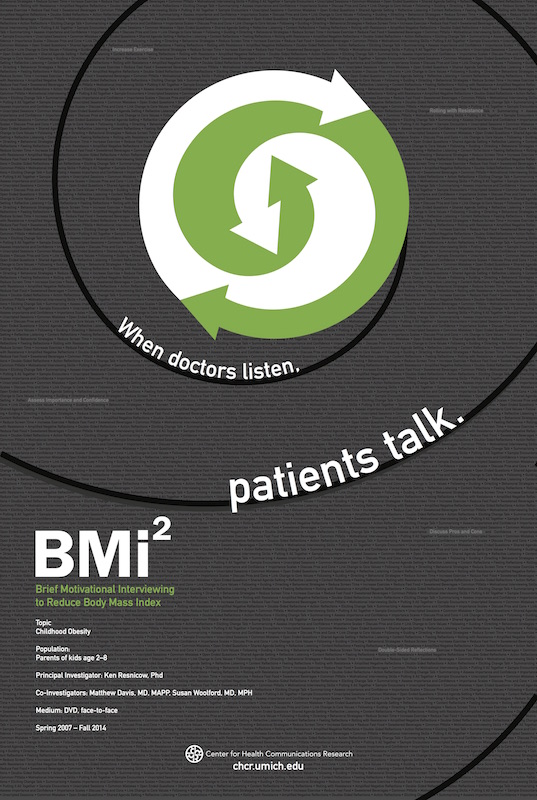2022
We are working on some great projects in 2022! We will add our 2022 projects after they launch.
2021
GIFT Pilot
The Genetic Information and Family Testing (GIFT) Study is designed to help families with a history of cancer more easily share important health information about hereditary cancer risk.
Investigator(s):
Lawrence C. An, MD (University of Michigan)
Steven J. Katz, MD, MPH (University of Michigan)
Allison Kurian, MD, M.Sc (Stanford University)
MiGHT
The MiGHT (Michigan Genetic Hereditary Testing) Study is a statewide effort to better identify and care for individuals and families with inherited risk of cancer.
Investigator(s):
Elena Stoffel, MD, MPH (University of Michigan)
Jennifer J. Griggs, MD, MPH (University of Michigan)
Ken Resnicow, PhD (University of Michigan)
CEAL
This project is supported by and reflects the goals of the Community Engagement Alliance (CEAL) Against COVID-19 Disparities initiative, funded by the National Institutes of Health, to conduct timely community-engaged COVID-19 research and outreach to reduce health inequities.
Investigator(s):
Lawrence C. An, MD (University of Michigan)
Ken Resnicow, PhD (University of Michigan)
Getting to Yes! Michigan
Getting to Yes Michigan is a program that is designed to improve understanding and acceptance of COVID-19 vaccines in 4 Michigan counties.
Investigator(s):
Ken Resnicow, PhD (University of Michigan)
Barbara Israel, DrPH, MPH (University of Michigan)
Lawrence C. An, MD (University of Michigan)
Susan Woolford, MD, MPH (University of Michigan)
Financial Toxicity
We developed a resource to educate newly diagnosed breast cancer patients about financial toxicity.
Investigator(s):
Laila A. Gharzai, MD, LLM (Northwestern University)
2020
SharES
The Shared decision Engagement System (SharES) study is a randomized controlled trial to evaluate patient- and clinician-facing features that are believed to improve patient-centered care for breast cancer patients.
Investigator(s):
Sarah T. Hawley, PhD, MPH (University of Michigan)
Reshma Jagsi, MD, DPhil (University of Michigan)
SynERgy
SynERgy is assessing whether an adaptive, reinforcement learning-based remote therapy intervention is efficacious in improving outcomes for higher-risk violently-injured adolescents.
Investigator(s):
Patrick Carter, MD (University of Michigan)
Ken Resnicow, PhD (University of Michigan)
Making Meaning
Making Meaning is a website that offers expressive writing as a way to reduce anxiety and stress.
Investigator(s):
Lawrence C. An, MD (University of Michigan)
Sarah T. Hawley, PhD, MPH (University of Michigan)
Ken Resnicow, PhD (University of Michigan)
James W. Pennebaker, PhD (University of Texas - Austin)
Current Together After Cancer
This study aims to pilot test a dyadic intervention for stage 3 colorectal cancer patients and their partners to improve surveillance care after initial treatment.
Investigator(s):
Christine M. Veenstra, MD, MSHP (University of Michigan)
Take the Mic
Take the Mic was a contest where community members could submit COVID-19 related messages and media.
COVID-19 Surveys
Online surveys assessing a range of attitudes and behaviors related to COVID-19.
Investigator(s):
Lawrence C. An, MD (University of Michigan)
Ken Resnicow, PhD (University of Michigan)
Sarah T. Hawley, PhD, MPH (University of Michigan)
COVID Communication Guides
We designed communication guides to help doctors communicate with patients about COVID-19
Investigator(s):
Reshma Jagsi, MD, DPhil (University of Michigan)
Laila A. Gharzai, MD, LLM (Northwestern University)
Ken Resnicow, PhD (University of Michigan)
Lawrence C. An, MD (University of Michigan)
GOAL
Guys/Girls Opt for Activities for Life (GOAL) intervention includes and after school GOAL club to incorporate physical activity and health eating, parent-child meetings, and a social networking website for parents to motivate each other.
Investigator(s):
Lorraine Robbins, PhD, RN, FNP-BC (Michigan State University)
2019
Tiny Cargo, Big Deal!
A study to test and compare two methods for educating parents/caregivers of children about child passenger safety.
Investigator(s):
Michelle Macy, MD, MS (Northwestern University)
Sleep Coach
The Sleep Coach app provides access to evidence-based CBT-I strategies for insomnia. It engages users with a computerized dialogue agent to support adoption and adherence to these evidence-based strategies.
Investigator(s):
Lawrence C. An, MD (University of Michigan)
Sarah T. Hawley, PhD, MPH (University of Michigan)
Tiffany Braley, MD, MS (University of Michigan)
Deirdre Conroy, PhD (University of Michigan)
Debra L. Barton, PhD, FAAN, RN (University of Michigan)
Open to Options
A chatbot for patients preparing for an oncology appointment
Sexual Recovery
An online program for prostate cancer patients and their partners to learn about sexual recovery after prostate cancer treatment.
Investigator(s):
Daniela A Wittmann, PhD, LMSW (University of Michigan)
OutsmartHPV
OutsmartHPV is a tailored website designed to encourage gay and bisexual men to receive vaccination for HPV.
Investigator(s):
Paul Reiter, PhD, MPH (The Ohio State University )
Community Health Survey
A survey to better understand the underlying sociodemographic, psychosocial, and behavioral factors driving disparities in cancer incidence and mortality within the Rogel Cancer Center catchment area.
Investigator(s):
Ken Resnicow, PhD (University of Michigan)
2018
Learn Your Risk: Finding Pancreatic Cancer Early
A web-based decision aid to assess preliminary risk factors for pancreatic cancer and help motivate high-risk individuals to discuss screening with a genetic counselor
Investigator(s):
Diane M. Simeone, MD (New York University)
Understanding Stroke
A tailored life-sustaining treatment decision support tool for stroke surrogate decision makers
Investigator(s):
Darin Zahuranec, MD, MS (University of Michigan)
2017
ManageHF4Life
ManageHF4Life is a mobile application designed to promote self-monitoring and self-management of heart failure. Behavior change interventions that focus on self-regulation are particularly well suited for automation. The use of technology can decrease the burden of self-monitoring and enhance self-regulatory efforts. Cyclical processes of goal setting, behavior change, and goal assessment can be easily tracked, charted, reviewed and automated.
Investigator(s):
Michael Dorsch, PharmD, MS (University of Michigan)
Scott Hummel, MD, MS (University of Michigan)
Todd Michael Koelling, MD (University of Michigan)
BRIDA
The Breast Reconstruction Information & Decision Advisory (BRIDA) provides information to breast cancer patients about breast reconstruction.
Investigator(s):
Edwin Grant Wilkins, MD (University of Michigan)
Elizabeth Hershey joins as Managing Director of CHCR
2016
LowSalt4Life
LowSalt4Life is an app designed to provide education, assistance, and support to people who are trying to reduce their sodium intake. It includes actionable push messages to promote adherence to a low sodium diet, and was developed using information derived from focus groups. The goal is to demonstrate the effectiveness of the mobile application in reducing sodium intake in participants with hypertension.
Investigator(s):
Michael Dorsch, PharmD, MS (University of Michigan)
Scott Hummel, MD, MS (University of Michigan)
Lawrence C. An, MD (University of Michigan)
Tips4Health (T4H)
An interactive, personalized, text-messaging program to help participants prevent cancer and lead a healthy life.
Investigator(s):
Lawrence C. An, MD (University of Michigan)
Ken Resnicow, PhD (University of Michigan)
Sarah T. Hawley, PhD, MPH (University of Michigan)
PAVE: Peer Advisors for Veteran Education
A multi-level technology platform was built to scale the PAVE program with online training materials, a mobile tracking system for Peer Advisors, and a management console
Investigator(s):
Michelle Kees, PhD (University of Michigan)
Sarah Hawley becomes co-director of CHCR
2015
HomeFront Strong
HomeFront Strong (HFS) is an 8 week group based resiliency intervention designed to support military spouses through deployment transitions.
Investigator(s):
Michelle Kees, PhD (University of Michigan)
2014
Breast Cancer Ally
Breast Cancer Ally is an iPhone app developed in partnership with University of Michigan breast cancer specialists. It provides information about breast cancer and helps patients at the University of Michigan Comprehensive Cancer Center manage their symptoms.
Investigator(s):
Michael Sabel, MD (University of Michigan)
2013
FIT
The goal of this project is to conduct a randomized controlled efficacy trial to address the problems with past intervention studies by 1) making the face-to-face group intervention shorter, 2) using an on-line program to compliment the group-based intervention for increasing dose, and by 3) tailoring a motivational and parenting skills program directly to parents' and adolescents' skill levels and cultural background.
Investigator(s):
Ken Resnicow, PhD (University of Michigan)
Dawn K. Wilson, PhD (University of South Carolina)
Dizztinct
This is a stepped-wedge, randomized clinical trial of a multi-faceted educational and care-process-based intervention designed to improve the guideline-concordant care of patients with BPPV presenting to the emergency department (ED) with dizziness.
Investigator(s):
Kevin Kerber, MD, MS (University of Michigan)
William Meurer, MD (University of Michigan)
Angela Fagerlin, PhD (University of Utah)
Get Connected
This study builds on the Project Connect Health Systems Intervention, adapting and piloting an online intervention (CONNECT-YM) that increases YMSM's HIV/STI awareness, and helps them identify culturally-competent sexual health providers where they may test for HIV/STIs.
Investigator(s):
José A. Bauermeister, PhD, MPH (University of Pennsylvania)
Visualizing Health
The Communicating Health and Risk Messages (CHARM) project will address the gap in our current knowledge by informing the design of health risk data visualizations across the full spectrum of risk communication goals.
Investigator(s):
Victor J. Strecher, PhD (University of Michigan)
Brian Zikmund-Fisher, PhD (University of Michigan)
Angela Fagerlin, PhD (University of Utah)
Ken Resnicow, PhD (University of Michigan)
Lawrence C. An, MD (University of Michigan)
Liver Transplant Organ Offer Tool
Create and pilot test a point-of-care physician decision aid for organ offers.
Investigator(s):
Michael L. Volk, MD, MSc, AGAF (Loma Linda University)
Lawrence C. An, MD (University of Michigan)
My Mobile Advice Program (MyMAP)
The current study develops and pilot tests a prototype My Mobile Advice Program (MyMAP). MyMAP is designed to a) provide real-time, algorithm-driven, personalized guidance to smokers' regarding how to manage common, non-serious, bothersome medication side-effects and nicotine withdrawal symptoms, b) provide patients with timely, individually-tailored, supportive encouragement to enhance their motivation for quitting and promote better adherence to their prescribed treatment regimen; c) alert providers to potentially serious adverse events or persistent bothersome symptoms that warrant timely medical intervention; and d) provide patients and providers 24/7 access to relevant educational and behavioral self-help information that can either be viewed online (via computer or smart phone) or printed for reference.
Investigator(s):
Jennifer McClure, PhD (Kaiser Permanente)
Sheryl L. Catz, PhD (University of California - Davis)
Lawrence C. An, MD (University of Michigan)
Strengthening physician communication about adolescent vaccines
The overarching goal of this proposal is to develop and test a 3-phase intervention to improve provider-level communication and recommendation for the HPV vaccine for adolescent patients.
Investigator(s):
Amanda F. Dempsey, MD, PhD, MPH (University of Colorado)
Karen Albright, PhD Miriam Dickinson, PhD Simon Hambidge, MD, PhD (University of Colorado )
Sean T. O’Leary, MD (University of Colorado)
eyeGuide: Personalized Tablet-based Glaucoma Education
This research program utilizes not only health behavior theory, but also principles from behavioral economics to create a personalized computer-based glaucoma education program that can be taught by non-physician educators to motivate improved self-management in glaucoma patients.
Investigator(s):
Paula Anne Newman-Casey, MD, MS (University of Michigan)
Improving Patient Decisions about Bariatric Surgery
Our proposal is highly innovative in that our decision support tool integrates data from a large clinical registry with individual patient data to provide patients with real-time, customized, accurate information regarding the risks and benefits of the treatment options to better inform decision making.
Investigator(s):
Nancy J. Birkmeyer, PhD Angela Fagerlin, PhD (University of Utah)
Sarah T. Hawley, PhD, MPH (University of Michigan)
Edward C. Norton, PhD (University of Michigan)
M. E. Michele Heisler, MD, MPA (University of Michigan )
Lisa Prosser, PhD (University of Michigan)
Mousumi Banerjee, PhD (University of Michigan)
Amir Abbas Ghaferi, MD (University of Michigan)
Technologically Enhanced Coaching (TEC): A Program for Improving Diabetes Outcomes
In an AHRQ-supported RCT we developed and tested tailored, interactive tools with diabetes and medication information embedded in the tool software that peer coaches and other outreach workers can employ to facilitate discussions with patients.
Investigator(s):
M. E. Michele Heisler, MD, MPA (University of Michigan )
Measurement and Methodology for Daily Patterns of Drug Use and Related Behaviors
Develop cutting-edge statistical methodology to address the missing data issue of prospective measurements (IVR and TM) and to examine reactivity and validity based on daily patterns of health risk behaviors (drug/alcohol use, violence, and HIV risk sexual behavior).
Investigator(s):
Yuh-Pey Anne Buu, PhD
CHCR joins IHPI and moves to the North Campus Research Center (NCRC)
2012

Puff City
The goal of Puff City is to develop and evaluate a multimedia, tailored web-based asthma management program to specifically target urban high school students. The program uses tailoring, in conjunction with theory-based models, to alter behavior through individualized health messages based on the user's beliefs, attitudes, and personal barriers to change. The content of the Puff City computer program is based on recommendations for patient education made by the National Asthma Education and Prevention Program, and focuses on three core behaviors: controller medication adherence, rescue inhaler availability, and smoking cessation/reduction. The entire program is voiced over, to accommodate low literacy.
SafER Teens
SafER Teens is an evidence-based brief intervention designed to target youth violence.
Investigator(s):
Maureen A. Walton, PhD, MPH (University of Michigan)
Rebecca Cunningham, MD (University of Michigan)
HPV Vaccination and You
The overarching research question is to investigate whether message tailoring affects the uptake of the HPV vaccine in a young adult population. In the current pilot study investigators hope to effectively design internet-based HPV vaccine materials that are adaptable for specific tailoring in future research based on our results.
Investigator(s):
Sara Konrath, PhD (Indiana University)
Mobile Dad
Our long-term goal is wide-scale dissemination of a mobile application that is highly usable within the USAF context and is tailored to USAF fathers of young children.
Investigator(s):
Shawna J. Lee, PhD (University of Michigan)
Lawrence C. An, MD (University of Michigan)
MiVideo-Video Visit Summary for Cancer Patients
This pilot project explores the use of video summaries to provide colon cancer patients with a resource when starting chemotherapy treatment.
Investigator(s):
John C. Krauss, MD (University of Michigan)
MyChemoCare
This study addresses critical gaps in cancer symptom management through the creation of a mobile chemotherapy symptom management application. The MyChemoCare application proactively assesses for the presence and severity of common chemotherapy side-effects and provides personally tailored feedback via daily SMS text messaging to enhance patient mastery in symptom self-management.
Investigator(s):
Lawrence C. An, MD (University of Michigan)
John C. Krauss, MD (University of Michigan)
iNSider
The overarching goal of this study is to strengthen our understanding of the patient and physician perspective of nephrotic syndrome, therapy, prognosis, and factors influencing disease management and to use the information generated from stakeholder engagement to inform the creation of a shared-learning online decision support tool.
Investigator(s):
Debbie Sue Gipson, MD (University of Michigan)
Lawrence C. An, MD (University of Michigan)
WeCareAdvisor: An Innovative Caregiver Tool to Assess and Manage Behavioral Symptoms of Dementia
WeCareAdvisor is a novel tool with the potential to significantly improve quality of life for families by changing how one of the most pernicious and challenging aspects of the disease of dementia, behavioral symptoms, are monitored and managed at home.
Investigator(s):
Helen C. Kales, MD, PPA Laura N. Gitlin, PhD
2011
E2Coach – Tailored Physics Coaching
E2Coach uses MTS to optimize the learning experience in large gateway science courses. Each student is provided an individualized interface to their class, one that dynamically recognizes their strengths and weaknesses, understands their motivations, and coaches them through the course.
Investigator(s):
Timothy A. McKay, PhD (University of Michigan)
Victor J. Strecher, PhD (University of Michigan)
August Evrard, PhD (University of Michigan)
Measuring Chemotoxicity with IVR
This study examines the agreement between prospective and retrospective reporting of toxicities and health care service use (e.g., unscheduled office visit, emergency department visit, hospitalization) by patients with cancer treated with systemic chemotherapy.
Investigator(s):
Christopher R. Friese, PhD, RN, AOCN, FAAN (University of Michigan)
Jennifer J. Griggs, MD, MPH (University of Michigan)
Yun Li, PhD (University of Michigan)
Neural predictors of synergy between self-affirmation and message tailoring
We hypothesize that self-affirmation manipulations that focus on a participant’s strengths, delivered prior to exposure to a targeted health communication, will reduce defensive processing of messages (e.g. counter arguing), increase self-efficacy to perform the target health behavior, and may lead to increased behavior change, compared to a non-affirmation control.
Investigator(s):
Emily B. Falk, PhD (University of Pennsylvania )
Storyteller Project
The goal of this study is to identify key ingredients of tailored narratives to promote childhood obesity prevention behaviors among mothers of preschool-aged Mexican American children.
Investigator(s):
Rachel E. Davis, PhD (University of South Carolina)
Karen E. Peterson, D.Sc. (University of Michigan)
Suzanne M. Cole, PhD (University of Michigan)
Advanced Directives Among Patients With Lung Cancer
The goal of this study is to determine if Advanced Directives (ADs) are completed more frequently when the rationale for doing so is communicated as a means to reducing surrogate decision-making burdens, rather than as a means of promoting patient autonomy.
Investigator(s):
Scott D. Halpern, MD, PhD (University of Pennsylvania )
Angela Fagerlin, PhD (University of Utah)
Joseph N. Cappella, PhD (University of Pennsylvania)
Kevin G. Volpp, MD, PhD (University of Pennsylvania)
George Loewenstein, PhD (Carnegie Mellon University)
Older Adult Perceptions of Shared Decisions in Colorectal Screening
The goal of this study is to understand how older and emerging-older adult patients and their physicians perceive shared decision-making (SDM), and how SDM, as perceived by patients, impacts adherence to recommended colorectal cancer screening.
Investigator(s):
L. Aubree Shay, PhD, MSSW
Hear on the Farm
Hear on the Farm tests the effectiveness of a targeted, interactive website to promote the use of hearing protection devices among farmers in order to reduce noise-induced hearing loss among this population.
Investigator(s):
Marjorie C. McCullagh, PhD, RN, APHN-BC, COHN-S, FAAOHN, FAAN (University of Michigan)
Victor J. Strecher, PhD (University of Michigan)
Lawrence C. An, MD (University of Michigan)
2010
ChemoDosing
This project aims to share evidence that supports full dosing for obese breast cancer patients with physicians.
Investigator(s):
Jennifer J. Griggs, MD, MPH (University of Michigan)
Sarah T. Hawley, PhD, MPH (University of Michigan)
Tunghi May Pini, MD, MPH
Me First
MeFirst aims to develop and refine a tailored risk communication intervention to improve HPV vaccination uptake in young adult women ages 18-26 when administered during a teachable moment.
Investigator(s):
Ruth Carlos, MD, MS, FACR (University of Michigan)
Vanessa Dalton, MD, MPH (University of Michigan)
Alaina Town Bennett, MD, MS
PRAAIS
PRAAIS (Project for African American Infant Safety) defines the specific barriers to infant supine sleep encountered by African American parents and how parents of supine sleeping infants overcame them.
Investigator(s):
Kathryn Moseley, MD, MPH (University of Michigan)
Victor J. Strecher, PhD (University of Michigan)
Healthy Moms/Healthy Daughters
Healthy Moms Healthy Daughters investigates the efficacy of an individually tailored web-based intervention to improve human papillomavirus (HPV) vaccination rates among adolescent daughters of African American women.
Investigator(s):
Ruth Carlos, MD, MS, FACR (University of Michigan)
Ken Resnicow, PhD (University of Michigan)
Amanda F. Dempsey, MD, PhD, MPH (University of Colorado)
Vanessa Dalton, MD, MPH (University of Michigan)
Mack T. Ruffin IV, MD, MPH (University of Michigan)
James Myles
BioBank Consent
The goal of this project is to standardize the informed consent process across biobank initiatives. This project includes the development of an ethically and socially responsible consent form for the MICHR biobank.
Investigator(s):
Kenneth J. Pienta, MD (Johns Hopkins University)
Nicholas H. Steneck, PhD (University of Michigan)
Alla Karnovsky, PhD (University of Michigan)
Frank J. Manion, PhD Lawrence C. An, MD (University of Michigan)
Narrative Video Library
This project aims to develop an online library of video vignettes that highlight a discussion with a leading researcher or practitioner who describe one problem in the process of dissemination and implementation (D&I) and show viewers how he/she solved the problem.
Investigator(s):
Borsika Rabin, PhD, MPH, PharmD Lawrence C. An, MD (University of Michigan)
Building Your New Normal
Building Your New Normal tests two novel approaches to improve the quality of post-treatment follow-up for prostate cancer survivors: IVR (interactive voice response)-administered EPIC and tailored versions of Michigan Cancer Consortium (MCC) guidelines for patients and their primary care providers
Investigator(s):
Ted A. Skolarus, MD, MPH, FACS (University of Michigan)
Margaret Holmes-Rovner, PhD (Michigan State University)
John D. Piette, PhD (University of Michigan)
Lawrence C. An, MD (University of Michigan)
John Thomas Wei, MD (University of Michigan)
Julie Phillips, MD, MPH (Michigan State University)
Joel J. Heidelbaugh, M.D., FAAFP, FACG (University of Michigan)
Masahito Jimbo, MD, PhD, MPH (University of Michigan)
Karl T. Rew, MD (University of Michigan)
Take the Pledge: Organ Donation
Take the Pledge rigorously evaluates the efficacy of a novel intervention in alumni (or graduate) chapters of African American sororities and fraternities in Michigan to increase organ and tissue donation, as assessed by registration in the Michigan Organ Donor Registry.
Investigator(s):
Ken Resnicow, PhD (University of Michigan)
Ann Andrews, MPH (National Kidney Foundation of Michigan)
Prostate Cancer Recurrence Risk Decision Aid
This project aims to develop and test methods of communicating information about androgen deprivation therapy (ADT) to patients and to determine how patients use it in their treatment decisions.
Investigator(s):
Daniel Allan Hamstra, MD, PhD (University of Michigan)
Shruti Jolly, MD (University of Michigan)
Doris Renee Brown, MD, PhD (Wake Forest Baptist Health)
Karin Barbara Olson PA-C, MS (University of Michigan)
John Thomas Wei, MD (University of Michigan)
Angela Fagerlin, PhD (University of Utah)
Jeremy M. G. Taylor, PhD (University of Michigan)
Liver Quality Decision Aid
This decision aid includes an exercise to help people decide the quality of available organs they might be willing to accept, given their specific risk of death in the next 3 months.
Investigator(s):
Michael L. Volk, MD, MSc, AGAF (Loma Linda University)
Lawrence C. An, MD (University of Michigan)
2009

iSTART
The objective of this project is to design and evaluate a tailored intervention delivered using web-based and cellphone text messages to promote medication adherence in adolescent liver transplant recipients who are transitioning from pediatric to adult-centered transplant care.
Investigator(s):
Emily MacDonald Fredericks, PhD (University of Michigan)

Q2: Questions about Quitting
The current study tests the effectiveness of four potentially important tailoring factors (decisional framework, self-efficacy, navigation autonomy, and proactive outreach) to increase motivation to quit.
Investigator(s):
Jennifer McClure, PhD (Kaiser Permanente)
Lawrence C. An, MD (University of Michigan)
Vijayan N. Nair, PhD (University of Michigan)
Victor J. Strecher, PhD (University of Michigan)
Larry An takes over as director of CHCR
2008

Positively Smoke Free
Positively Smoke Free is a smoking cessation project for persons living with HIV/AIDS (PLWHAs) that takes place in an Infections Disease Clinic in New York City.
Inside Health
This project tests two interventions to increase colorectal cancer screening among African American members of the Henry Ford Health System.
Investigator(s):
Jennifer Elston Lafata, PhD (University of North Carolina)
Ken Resnicow, PhD (University of Michigan)
Victor J. Strecher, PhD (University of Michigan)
Emily B. Falk, PhD (University of Pennsylvania )
Mack T. Ruffin IV, MD, MPH (University of Michigan)
Masahito Jimbo, MD, PhD, MPH (University of Michigan)
Sarah T. Hawley, PhD, MPH (University of Michigan)
Rachel E. Davis, PhD (University of South Carolina)
Survivorship Resource Room
Breast cancer survivors often experience challenges as they transition from treatment to survivorship. The Survivorship Resource Room offers informational, emotional, and instrumental support during this transition.
Puff City wins a Freddie Award: International Health & Medical Media Award. It received 1st place in the Allergies & Asthma category and was a finalist in the Inflammatory Diseases category
The Summer Institute brought researchers to Ann Arbor from across the country for several days to learn about health tailoring and MTS
The Michigan Tailoring System (MTS) is released as the first publicly available software that enables the creation and dissemination of individually tailored health communication.
CHCR is awarded another Center of Excellence in Cancer Communications Research (CECCR2) grant.
2007

BMi2
BMi2 is a DVD for pediatricians and dietitians that have completed a 2-day intensive motivational interviewing (MI) training session.

The RealU
The RealU is a randomized trial to determine the efficacy of providing: individually tailored web-based messages, individually tailored messages plus peer support email and video messages as part of an online program.
Investigator(s):
Lawrence C. An, MD (University of Michigan)
Jasjit S. Ahluwalia, MD, MPH, MS John Connett, PhD (University of Minnesota)
Victor J. Strecher, PhD (University of Michigan)
Colleen M. Klatt, PhD Xianghua Luo, PhD (University of Minnesota)
Janet Thomas, PHD, LP (University of Minnesota)
Theodore V. Cooper, PhD (University of Texas - El Paso)
Osvaldo F. Morera, PhD (University of Texas - El Paso)
Ken Resnicow, PhD (University of Michigan)
iQuitSmoking
This project is a 3-group prospective randomized controlled trial to determine the efficacy and cost-effectiveness of providing access to free nicotine patches, with or without a required linkage to proactive telephone counseling, as adjuncts to a tailored, web-based smoking cessation program.
Investigator(s):
Lawrence C. An, MD (University of Michigan)
Victor J. Strecher, PhD (University of Michigan)
Anne Joseph, MD, MPH (University of Minnesota)
Jasjit S. Ahluwalia, MD, MPH, MS Alexander J. Rothman, PhD (University of Minnesota)
John Connett, PhD (University of Minnesota)
John A. Nyman, PhD (University of Minnesota)
Colleen M. Klatt, PhD
Eye Tracking Tailored Photos
This study explores the effects images have on the amount of time spent reading text that is shown alongside images. Specifically, the project examines the time a smoker spends reading 3 brief testimonials, as well as the time spent looking at the images shown alongside the testimonials.
Investigator(s):
Hannah Faye C. Chua, PhD
Diabetes Self-Management for Mexican Americans
This feasibility study explores audience segment characteristics among Mexican Americans with type 2 diabetes ranging from low to high on acculturation and structural assimilation.
Investigator(s):
Rachel E. Davis, PhD (University of South Carolina)
Improving Risk Communication through Tailored Testimonials
Two experiments examine the effects of tailored testimonials on people's knowledge, satisfaction, interest in shared decision-making, and behavioral intentions after reading a colorectal cancer screening decision aid.
Investigator(s):
Amanda Dillard, PhD (Grand Valley State University)
Neural Bases of Effectiveness of Individually Tailored Smoking Cessation Messages
Study 1 explores the self-relevance dimension of message tailoring while Study 2 focuses on the adaptation of content from message tailoring.
Investigator(s):
Hannah Faye C. Chua, PhD Victor J. Strecher, PhD (University of Michigan)
Israel Liberzon, MD (University of Michigan)
Thad A. Polk, PhD (University of Michigan)
2006
Tools for Being a Helpful Peer Partner – DVD
The goal of the DVD is to teach people with congestive heart failure how to support each other in managing their illness via phone calls to each other.
Investigator(s):
M. E. Michele Heisler, MD, MPA (University of Michigan )
Ken Resnicow, PhD (University of Michigan)
Cessation Messages & Neural Activation
This study explores whether listening to high-tailored smoking cessation messages activates the rostral medial prefrontal region more than listening to linguistically comparable but low-tailored cessation messages.
Investigator(s):
Hannah Faye C. Chua, PhD
Decider Guider
This study translates a paper-based preference-screening tool into a web-based preference-tailored intervention that is effective for increasing informed decision making (IDM) and compliance with colorectal cancer (CRC) screening. The computer-based preference tool is used in clinical settings to help low-risk individuals decide which of five CRC screening tests best fits their preferences.
Investigator(s):
Sarah T. Hawley, PhD, MPH (University of Michigan)
Steven J. Katz, MD, MPH (University of Michigan)
Joel Rubenstein, MD, MSc (University of Michigan)
Angela Fagerlin, PhD (University of Utah)
Philip S. Schoenfeld, MD, MSEd, MSc Sandeep Vijan, MD, MS (University of Michigan)
2005
Web Scatter
This study enables us to: (1) deepen our understanding of why users find it difficult to find comprehensive information about healthcare topics, and (2) provide explicit guidelines for how pages in healthcare websites should be linked to enable users to easily navigate through the site, with the ultimate goal of facilitating the process of finding comprehensive information.
Investigator(s):
Suresh K. Bhavnani, PhD (University of Texas)
2003
Eat for Life
Eat for Life examines two constructs of tailoring within a print-based fruit and vegetable intervention for African American adults.
Investigator(s):
Ken Resnicow, PhD (University of Michigan)
Christine D. Cole Johnson, PhD, MPH (Henry Ford Health System)
Dennis D. Tolsma, MPH (Kaiser Permanente)
Guide to Decide
Guide to Decide uses a multi-phased experimental process to explore methods of communicating risk regarding tamoxifen or raloxifene prophylaxis to women at high risk for breast cancer.
Investigator(s):
Victor J. Strecher, PhD (University of Michigan)
Angela Fagerlin, PhD (University of Utah)
Peter A. Ubel, MD (Duke University)
Brian Zikmund-Fisher, PhD (University of Michigan)
Jennifer McClure, PhD (Kaiser Permanente)
Sharon M. Hensley Alford, PhD (Henry Ford Health System)
Daniel F. Hayes, MD (University of Michigan)
Paula Lantz, PhD (University of Michigan)
Priti R. Shah, PhD (University of Michigan)
Dylan M. Smith, PhD (Stony Brook University)
Stephen H. Taplin, MD, MPH (National Cancer Institute)
THeME Non-responders
This study's primary goal is to identify ways to reduce non-response, attrition, and missing data for web surveys in parallel with the core research activities of the CECCR Research Projects.
Investigator(s):
Mick P. Couper, PhD (University of Michigan)
The HMRL is renamed the Center for Health Communications Research (CHCR)
The HMRL is awarded the Center of Excellence in Cancer Communications Research (CECCR1) grant to develop an efficient, theory-driven model for generating tailored health behavior interventions are is generalizable across health behaviors and socio-demographic populations.
2002
Web Filtering
This project provides a careful empirical assessment of the extent to which access to health information is impeded or aided by commercial Internet filters as commonly configured in homes, schools, and libraries.
Investigator(s):
Paul Resnick, PhD (University of Michigan)
2001
Girls on the Move
Girls on the Move is a computer-based interactive physical activity program used in school-based clinics as a counseling tool about exercise among adolescent girls.
Investigator(s):
Nola J. Pender, PhD, RN, FAAN (University of Michigan)
Unto E. Pallonen, PhD (University of Texas)
Lorraine Robbins, PhD, RN, FNP-BC (Michigan State University)
Taking CHARGE
This program aims to lend support, both medically and emotionally, to breast cancer survivors who have recently completed their treatment programs. The goal for this project is to create a workbook to be distributed to all women who participate in Taking CHARGE.
Investigator(s):
Bernadine Cimprich, PhD, RN, FAAN (University of Michigan)
The Breast Cancer Genetics Website and Health ‘o’ Vision are honored by the Computerworld Smithsonian Program for innovative use of information technology
2000
Health’o’Vision
The Michigan Interactive Health Kiosk Demonstration Project project involves creating and disseminating twelve multimedia health programs. Collectively known as Health'o'Vision, topics include cancer prevention and screening, disease management, and general health practices to live a healthy life. Channels are created for both adults and adolescents. One hundred kiosks are deployed in a variety of settings throughout the State of Michigan for use by the general public.
coloWeb
This project focuses on development of a tailored web-based program that allows patients to receive individually tailored information about colorectal screening initiatives. The program is evaluated in a randomized controlled trial at three primary care clinics. This project combines efforts with coloWeb (Ruffin) to complete both focus groups and a pilot test of the tailored program.
